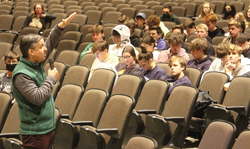Highland students get college admission insight from author
by Chris Studor
It’s coming down to the wire for Highland High School seniors who are making their final decisions on where to go to college, while the junior class is focused on getting admitted to the college of their choice – hopefully with some financial aid thrown in for good measure.
Students and parents recently received some top-notch advice on both topics from an industry expert, New York Times best-selling author Jeffrey Selingo who penned the book, “Who Gets in and Why – A Year Inside College Admissions.”
Selingo, who spent three years with college admissions officers as they reviewed thousands of applications, spoke to guests in the high school auditorium Feb.8, and conducted private work sessions with school guidance counselors and administrators, as well as high school juniors and seniors, Feb. 9. Selingo’s visit was funded by the Highland Foundation.
“Choosing a college is a very emotional decision,” said Selingo, whose visit was paid for by the Highland Foundation. “Parents and students want certainty and there is no certainty. Every college has a different admissions process. There is no set formula. At the end of the day, college admissions officers only spend about 15 minutes reviewing applications and that includes reading an applicant’s essay. When it comes to that essay, I tell students to be authentic and let that essay reflect who you are as a person.”
Highland senior Emily Dunn said she spent “countless” hours on her essay.
“Now that I know they look at your application for only about 15 minutes I see I didn’t need to stress as much over it,” Dunn, who has her eyes on the University of Akron and the University of Mount Union, said.
Selingo said a huge factor in who is admitted is the level of mathematics students achieved. He also noted that taking Advanced Placement calculus in high school is highly desired, even if a student is not majoring in a mathematics-related major.
Activities outside academics, such as being on the high school debate team or achieving the rank of Eagle Scout, are also achievements, which most colleges rank highly among applicants.
“The big three things college admissions officers are looking for are; business ability, technical ability and the human factor,” said Selingo. “With students using a lot of texting on their phones, it’s vital that they show an ability to communicate face to face with people. This will be equally vital when they go to apply for their first job.”
Selingo said it’s also important for students to view college as the precursor to their career. What really matters when they apply for their first job, or graduate school, is not so much which college they attended, he said, but what a student does while attending college.
If a student can get involved with an internship and/or research project at college, it’s a huge advantage when applying for that first job, he said.
Highland senior Maddie Miller said when researching colleges, she was drawn to colleges that offered co-op opportunities in her field of study, which happens to be chemical or mechanical engineering.
“I decided to put academics ahead of athletics when looking for a college since I knew I wanted to be an engineer,” she said. “[Selingo] reinforced what I thought and that is the college you choose is important but what you do while you are there is more important and I thought the co-op opportunity was a key.”
Selingo said it’s equally important for high school students to take high school courses that are attractive to college admissions officers.
“Admissions officers are looking for students who challenge themselves,” he said. “It is more important, generally, to take AP calculus and get a grade of B than to take regular calculus and get an A, but you don’t want to get a D in AP calculus either.”
Aiding in the transition
Highland High School Guidance Counselor Jim Addington said that, on average, about 92% of each graduating class moves on to pursue either two- or four-year degrees. Of the 271 graduates in the 2021 class, 75.4% moved on to four-year colleges, while 1.3% to a two-year or technical college, and 1.5% enlisted in the military.
Addington added that students at Highland begin exploring careers and colleges in middle school through Naviance, a college-planning tool that assist students in gauging their strengths and interests. He said students typically apply to four or five colleges at the beginning of their senior year of high school with final decisions usually confirmed by May 1.
In addition to the academic side of college applications, Addington said Highland High School partners with College Now of Greater Cleveland, also funded through the Highland Foundation. The partnership offers students and their families a resource for college financial advising.
Selingo reminded students to keep in contact with college admissions officers throughout the application process, noting that colleges track whether applicants open up emails they send, including links for more information. They also note whether students attend college visitation days – both at the college and when college representatives visit their high school.
He said follow-up thank you notes expressing interest are a great way to let college admissions officers know that a student is serious about that college.∞

